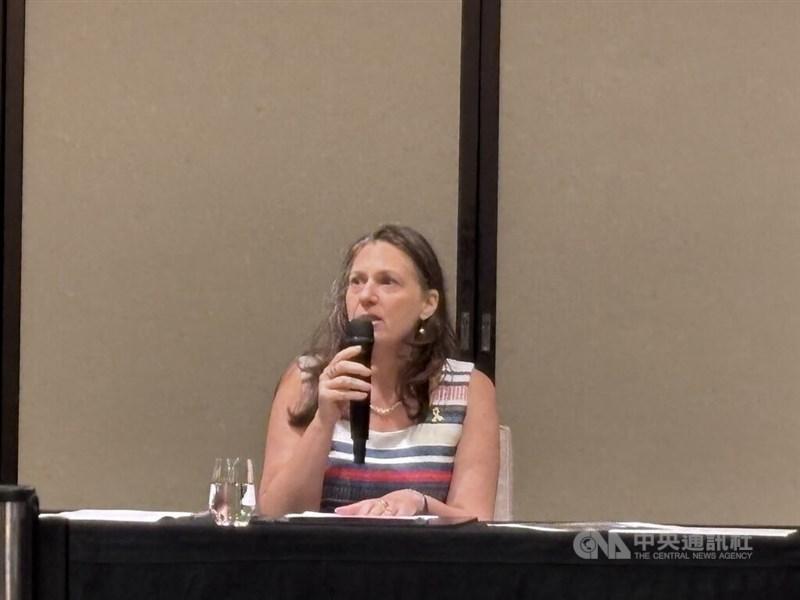Israel's top envoy in Taiwan today said that her country's decision to attack Iran was an "act of self-defense.”
"For us, defending our country is something that we must do, and we needed to act on time before it's too late, before they [Iran] have a nuclear atomic bomb," Israel Economic and Cultural Office in Taipei Representative Maya Yaron told a news conference in Taipei.
Operation Rising Lion aims to neutralize Iran's nuclear and ballistic missile programs so that Israel no longer faces an immediate existential threat, she said.

Photo: CNA
Israel is smaller in size and has a smaller population than Taiwan, and is facing the threat of 10,000 missiles from Iran, Yaron said.
Iran is a "radical Islamist regime," "a dictatorship" and "the most repressive government in the world," she said.
"Everything that you know about Taiwan's way of life, about Taiwan's vibrant democracy, does not exist in Iran. No women's rights, no LGBTQI, no freedom of press, no freedom of speech. There is no democracy. There is only oppression. This is a terrorist regime that is acting against its own people," Yaron said.
"We who belong to the free world and we [who] are in this community together, we must remain aware and we must be united in front of any tactics that try to distort us from this truth," she said, speaking about an Israel-Iran war misinformation campaign.
"There is no other alternative. We cannot have this regime have nuclear weapons," she added.
Israeli Prime Minister Benjamin Netanhayu has made multiple claims about the "imminent threat" of Iran developing nuclear weapons dating back to 1992.
On March 25, US Director of National Intelligence Tulsi Gabbard, speaking at a US Senate Select Committee on Intelligence hearing for the Annual Threat Assessment of the US Intelligence Community, said that Iran was not building nuclear weapons and had not resumed its suspended 2003 nuclear weapons program.
Asked whether Iran was developing nuclear weapons in an interview with CNN on Tuesday last week, International Atomic Energy Agency (IAEA) Director-General Rafael Grossi said: "We did not have any proof of a systematic effort to move into a nuclear weapon."
Israel is widely believed to have its own extensive nuclear weapons program, but unlike Iran, has not signed the Treaty on the Non-Proliferation of Nuclear Weapons and does not grant the IAEA full access to its nuclear facilities.
The conflict between Israel and Iran began on June 13, when Israel launched a series of attacks on key Iranian military and nuclear facilities, killing some of Iran's top military leaders, nuclear scientists and politicians.
Iran retaliated by launching missiles toward military sites and cities in Israel.
Yesterday, the US bombed three Iranian nuclear sites.
Tehran said the US would "receive a response" and that all US bases in the Middle East were "legitimate targets," hinting at a potential wider conflict.
In Taipei, Presidential Office spokesperson Karen Kuo (郭雅慧) said that the government's national security team has been closely monitoring tensions in the Middle East and regularly briefing President William Lai (賴清德).
Lai has instructed the national security team and the executive branch to remain alert and respond to potential political and economic risks, Kuo said.
The government would continue to maintain close contact with its allies to ensure stability and the safety of Taiwanese, she added.

The Coast Guard Administration (CGA) yesterday said it had deployed patrol vessels to expel a China Coast Guard ship and a Chinese fishing boat near Pratas Island (Dongsha Island, 東沙群島) in the South China Sea. The China Coast Guard vessel was 28 nautical miles (52km) northeast of Pratas at 6:15am on Thursday, approaching the island’s restricted waters, which extend 24 nautical miles from its shoreline, the CGA’s Dongsha-Nansha Branch said in a statement. The Tainan, a 2,000-tonne cutter, was deployed by the CGA to shadow the Chinese ship, which left the area at 2:39pm on Friday, the statement said. At 6:31pm on Friday,

The Chinese People’s Liberation Army Navy’s (PLAN) third aircraft carrier, the Fujian, would pose a steep challenge to Taiwan’s ability to defend itself against a full-scale invasion, a defense expert said yesterday. Institute of National Defense and Security Research analyst Chieh Chung (揭仲) made the comment hours after the PLAN confirmed the carrier recently passed through the Taiwan Strait to conduct “scientific research tests and training missions” in the South China Sea. China has two carriers in operation — the Liaoning and the Shandong — with the Fujian undergoing sea trials. Although the PLAN needs time to train the Fujian’s air wing and

The American Institute in Taiwan (AIT) put Taiwan in danger, Ma Ying-jeou Foundation director Hsiao Hsu-tsen (蕭旭岑) said yesterday, hours after the de facto US embassy said that Beijing had misinterpreted World War II-era documents to isolate Taiwan. The AIT’s comments harmed the Republic of China’s (ROC) national interests and contradicted a part of the “six assurances” stipulating that the US would not change its official position on Taiwan’s sovereignty, Hsiao said. The “six assurances,” which were given by then-US president Ronald Reagan to Taiwan in 1982, say that Washington would not set a date for ending arm sales to Taiwan, consult

A Taiwanese academic yesterday said that Chinese Ambassador to Denmark Wang Xuefeng (王雪峰) disrespected Denmark and Japan when he earlier this year allegedly asked Japan’s embassy to make Taiwan’s representatives leave an event in Copenhagen. The Danish-language Berlingske on Sunday reported the incident in an article with the headline “The emperor’s birthday ended in drama in Copenhagen: More conflict may be on the way between Denmark and China.” It said that on Feb. 26, the Japanese embassy in Denmark held an event for Japanese Emperor Naruhito’s birthday, with about 200 guests in attendance, including representatives from Taiwan. After addressing the Japanese hosts, Wang